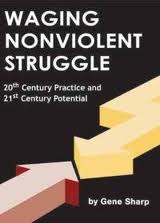 Gene Sharp’s slim volume, From Dictatorship to Democracy, outlines why and how non-violent struggle is the warfare of the 21st century, and builds a template for thinking and acting strategically to remove dictators and build democracy.
Gene Sharp’s slim volume, From Dictatorship to Democracy, outlines why and how non-violent struggle is the warfare of the 21st century, and builds a template for thinking and acting strategically to remove dictators and build democracy.
The book has been a powerful influence within movements that have toppled dictatorships over the past two decades.
Sharp, is the founder and senior scholar of the Albert Einstein Institution. He wrote the book (which you can download for free above) in the 90s for the democracy movement in Burma. It was first published there with the help of the Committee for the Restoration of Democracy in Burma.
If you had any doubts about the fact that social change is largely about the battle of ideas, at that time, Burma’s military dictatorship did not. They renounced the book and people were condemned to seven-year prison sentences for simply having it in their possession.
The book was translated into Indonesian by Indonesians. It was translated into Serbian by Serbians and became a major touchstone for Otpor, the Serbian student movement organization that led the nonviolent revolution that brought down Milosovec.
That struggle and Otpor’s actions and strategies were studied by the Egyptian student movement. Online. On youtube. Then Otpor leaders came to Egypt to meet with them. And Egyptian student leaders went to Serbia to receive training in non-violent strategy and action from the Serbian students.
And in the process, the book was translated into Egyptian and became a resource for actions that are now known as Arab Spring.
A more much longer volume on non-violent struggle and strategy by Sharp is Waging Nonviolent Struggle: 20th Century Practice and 21st Century Potential, which briefly describes over 20 nonviolent struggles of the 20th century, including the Russian Revolution of 1905, Montgomery bus boycotts of the 1950s, School boycotts in South Africa in the 1980s, and the removal of Milosevic in Serbia at the end of the century.
Sharp methodically assesses these events as a foundation for his argument and methodology of strategic thinking, planning, and action to create a more deeply democratic world.
